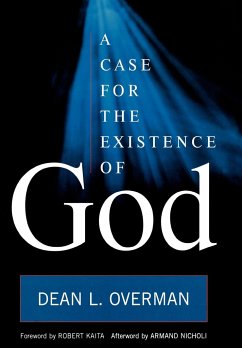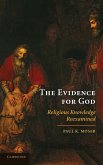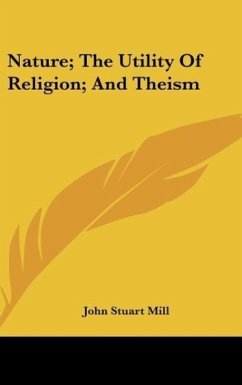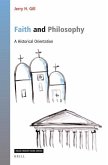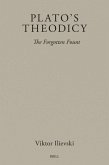Dean L Overman
Case for the Existence of God
Dean L Overman
Case for the Existence of God
- Gebundenes Buch
- Merkliste
- Auf die Merkliste
- Bewerten Bewerten
- Teilen
- Produkt teilen
- Produkterinnerung
- Produkterinnerung
A Case for the Existence of God explores fundamental questions about why our world exists and how it functions, using principles of logic, physics, and theology to show that a belief in God can explain more about our world than even the most sophisticated science. In a time when religion and science are often portrayed as diametrically opposed, Dean Overman presents a refreshing view of the interplay between science and religion and makes a compelling case for the existence of God and his role in our world.
Andere Kunden interessierten sich auch für
![The Evidence for God The Evidence for God]() Paul K. MoserThe Evidence for God63,99 €
Paul K. MoserThe Evidence for God63,99 €![The Science of Natural Theology; or, God the Unconditioned Cause, and God the Infinite and Perfect as Revealed in Creation The Science of Natural Theology; or, God the Unconditioned Cause, and God the Infinite and Perfect as Revealed in Creation]() Asa MahanThe Science of Natural Theology; or, God the Unconditioned Cause, and God the Infinite and Perfect as Revealed in Creation36,99 €
Asa MahanThe Science of Natural Theology; or, God the Unconditioned Cause, and God the Infinite and Perfect as Revealed in Creation36,99 €![Nature; The Utility Of Religion; And Theism Nature; The Utility Of Religion; And Theism]() John Stuart MillNature; The Utility Of Religion; And Theism33,99 €
John Stuart MillNature; The Utility Of Religion; And Theism33,99 €![The Abrahamic Vernacular The Abrahamic Vernacular]() Rebecca Scharbach WollenbergThe Abrahamic Vernacular69,99 €
Rebecca Scharbach WollenbergThe Abrahamic Vernacular69,99 €![The Life and Work of Ernesto De Martino The Life and Work of Ernesto De Martino]() Flavio GeisshueslerThe Life and Work of Ernesto De Martino113,99 €
Flavio GeisshueslerThe Life and Work of Ernesto De Martino113,99 €![Faith and Philosophy Faith and Philosophy]() Jerry GillFaith and Philosophy130,99 €
Jerry GillFaith and Philosophy130,99 €![Plato's Theodicy Plato's Theodicy]() Viktor IlievskiPlato's Theodicy150,99 €
Viktor IlievskiPlato's Theodicy150,99 €-
-
-
A Case for the Existence of God explores fundamental questions about why our world exists and how it functions, using principles of logic, physics, and theology to show that a belief in God can explain more about our world than even the most sophisticated science. In a time when religion and science are often portrayed as diametrically opposed, Dean Overman presents a refreshing view of the interplay between science and religion and makes a compelling case for the existence of God and his role in our world.
Produktdetails
- Produktdetails
- Verlag: Bloomsbury Publishing PLC
- Seitenzahl: 264
- Erscheinungstermin: 1. Februar 2008
- Englisch
- Abmessung: 235mm x 157mm x 20mm
- Gewicht: 595g
- ISBN-13: 9780742563124
- ISBN-10: 074256312X
- Artikelnr.: 25009670
- Herstellerkennzeichnung
- Libri GmbH
- Europaallee 1
- 36244 Bad Hersfeld
- gpsr@libri.de
- Verlag: Bloomsbury Publishing PLC
- Seitenzahl: 264
- Erscheinungstermin: 1. Februar 2008
- Englisch
- Abmessung: 235mm x 157mm x 20mm
- Gewicht: 595g
- ISBN-13: 9780742563124
- ISBN-10: 074256312X
- Artikelnr.: 25009670
- Herstellerkennzeichnung
- Libri GmbH
- Europaallee 1
- 36244 Bad Hersfeld
- gpsr@libri.de
Dean L. Overman
Foreword
Preface
Acknowledgments
Chapter 1: Introduction
Chapter 2: The question of God's existence: the radical contingency of the
universe points toward a necessary being
Chapter 3: Many generations of philosophers have made the mistake of
assuming Hume and Kant's objections disposed of the cosmological argument
Chapter 4: A universe with an infinite past would still require a necessary
being to sustain its existence
Chapter 5: Because the universe (or multiverse) had a beginning, it is
contingent and has a cause for its coming into existence
Chapter 6: The philosophy of nature set forth in this book emphasizes the
intelligibility of the universe noted in Einstein's statement: "The most
incomprehensible thing about the world is that it is comprehensible." A
significant issue in examining the "something" that exists is Why is it
intelligible?
Chapter 7: Evolution is not dispositive of the question of why there is
something rather than nothing and why the universe is rational and
intelligible
Chapter 8: The mystery of information challenges a strict materialism
Chapter 9: The existence of God gives an absolute that is consistent with
the real existence of right and wrong
Chapter 10: Evidential force of religious experience: If God is a person,
God can be known to only a very limited extent by abstract reasoning and is
more fully known by personal acquaintance in an I-Thou relationship with
the Wholly Other
Chapter 11: Recorded experiences of encounters with the divine bear witness
to a way of knowing that includes Kierkegaard's Kendskab, Buber's I-Thou,
Otto's Wholly Other, and Marcel's Mystery
Chapter 12: These nine witnesses testify to another way of knowing that is
compatible with the empirical and the metaphysical rational ways of
knowing, but is beyond the describable and requires personal participation,
commitment, and personal transformation
Chapter 13: Concluding reflections and summary: Theism requires a leap of
faith, but it is a leap into the light, not into the dark; theism explains
more than Atheism, which also requires a leap of faith
Afterword
Appendix A: The new mathematics of algorithmic information theory is
relevant to theories concerning the formation of the first living matter
Appendix B: The limits of mathematics and the limits of reason: Why
everyone will always live by faith rather than certainty
Appendix C: The evidence from contemporary physics supports the concepts of
personal responsibility and free will
Notes
Selected Bibliography
Index
About the Author
Preface
Acknowledgments
Chapter 1: Introduction
Chapter 2: The question of God's existence: the radical contingency of the
universe points toward a necessary being
Chapter 3: Many generations of philosophers have made the mistake of
assuming Hume and Kant's objections disposed of the cosmological argument
Chapter 4: A universe with an infinite past would still require a necessary
being to sustain its existence
Chapter 5: Because the universe (or multiverse) had a beginning, it is
contingent and has a cause for its coming into existence
Chapter 6: The philosophy of nature set forth in this book emphasizes the
intelligibility of the universe noted in Einstein's statement: "The most
incomprehensible thing about the world is that it is comprehensible." A
significant issue in examining the "something" that exists is Why is it
intelligible?
Chapter 7: Evolution is not dispositive of the question of why there is
something rather than nothing and why the universe is rational and
intelligible
Chapter 8: The mystery of information challenges a strict materialism
Chapter 9: The existence of God gives an absolute that is consistent with
the real existence of right and wrong
Chapter 10: Evidential force of religious experience: If God is a person,
God can be known to only a very limited extent by abstract reasoning and is
more fully known by personal acquaintance in an I-Thou relationship with
the Wholly Other
Chapter 11: Recorded experiences of encounters with the divine bear witness
to a way of knowing that includes Kierkegaard's Kendskab, Buber's I-Thou,
Otto's Wholly Other, and Marcel's Mystery
Chapter 12: These nine witnesses testify to another way of knowing that is
compatible with the empirical and the metaphysical rational ways of
knowing, but is beyond the describable and requires personal participation,
commitment, and personal transformation
Chapter 13: Concluding reflections and summary: Theism requires a leap of
faith, but it is a leap into the light, not into the dark; theism explains
more than Atheism, which also requires a leap of faith
Afterword
Appendix A: The new mathematics of algorithmic information theory is
relevant to theories concerning the formation of the first living matter
Appendix B: The limits of mathematics and the limits of reason: Why
everyone will always live by faith rather than certainty
Appendix C: The evidence from contemporary physics supports the concepts of
personal responsibility and free will
Notes
Selected Bibliography
Index
About the Author
Foreword
Preface
Acknowledgments
Chapter 1: Introduction
Chapter 2: The question of God's existence: the radical contingency of the
universe points toward a necessary being
Chapter 3: Many generations of philosophers have made the mistake of
assuming Hume and Kant's objections disposed of the cosmological argument
Chapter 4: A universe with an infinite past would still require a necessary
being to sustain its existence
Chapter 5: Because the universe (or multiverse) had a beginning, it is
contingent and has a cause for its coming into existence
Chapter 6: The philosophy of nature set forth in this book emphasizes the
intelligibility of the universe noted in Einstein's statement: "The most
incomprehensible thing about the world is that it is comprehensible." A
significant issue in examining the "something" that exists is Why is it
intelligible?
Chapter 7: Evolution is not dispositive of the question of why there is
something rather than nothing and why the universe is rational and
intelligible
Chapter 8: The mystery of information challenges a strict materialism
Chapter 9: The existence of God gives an absolute that is consistent with
the real existence of right and wrong
Chapter 10: Evidential force of religious experience: If God is a person,
God can be known to only a very limited extent by abstract reasoning and is
more fully known by personal acquaintance in an I-Thou relationship with
the Wholly Other
Chapter 11: Recorded experiences of encounters with the divine bear witness
to a way of knowing that includes Kierkegaard's Kendskab, Buber's I-Thou,
Otto's Wholly Other, and Marcel's Mystery
Chapter 12: These nine witnesses testify to another way of knowing that is
compatible with the empirical and the metaphysical rational ways of
knowing, but is beyond the describable and requires personal participation,
commitment, and personal transformation
Chapter 13: Concluding reflections and summary: Theism requires a leap of
faith, but it is a leap into the light, not into the dark; theism explains
more than Atheism, which also requires a leap of faith
Afterword
Appendix A: The new mathematics of algorithmic information theory is
relevant to theories concerning the formation of the first living matter
Appendix B: The limits of mathematics and the limits of reason: Why
everyone will always live by faith rather than certainty
Appendix C: The evidence from contemporary physics supports the concepts of
personal responsibility and free will
Notes
Selected Bibliography
Index
About the Author
Preface
Acknowledgments
Chapter 1: Introduction
Chapter 2: The question of God's existence: the radical contingency of the
universe points toward a necessary being
Chapter 3: Many generations of philosophers have made the mistake of
assuming Hume and Kant's objections disposed of the cosmological argument
Chapter 4: A universe with an infinite past would still require a necessary
being to sustain its existence
Chapter 5: Because the universe (or multiverse) had a beginning, it is
contingent and has a cause for its coming into existence
Chapter 6: The philosophy of nature set forth in this book emphasizes the
intelligibility of the universe noted in Einstein's statement: "The most
incomprehensible thing about the world is that it is comprehensible." A
significant issue in examining the "something" that exists is Why is it
intelligible?
Chapter 7: Evolution is not dispositive of the question of why there is
something rather than nothing and why the universe is rational and
intelligible
Chapter 8: The mystery of information challenges a strict materialism
Chapter 9: The existence of God gives an absolute that is consistent with
the real existence of right and wrong
Chapter 10: Evidential force of religious experience: If God is a person,
God can be known to only a very limited extent by abstract reasoning and is
more fully known by personal acquaintance in an I-Thou relationship with
the Wholly Other
Chapter 11: Recorded experiences of encounters with the divine bear witness
to a way of knowing that includes Kierkegaard's Kendskab, Buber's I-Thou,
Otto's Wholly Other, and Marcel's Mystery
Chapter 12: These nine witnesses testify to another way of knowing that is
compatible with the empirical and the metaphysical rational ways of
knowing, but is beyond the describable and requires personal participation,
commitment, and personal transformation
Chapter 13: Concluding reflections and summary: Theism requires a leap of
faith, but it is a leap into the light, not into the dark; theism explains
more than Atheism, which also requires a leap of faith
Afterword
Appendix A: The new mathematics of algorithmic information theory is
relevant to theories concerning the formation of the first living matter
Appendix B: The limits of mathematics and the limits of reason: Why
everyone will always live by faith rather than certainty
Appendix C: The evidence from contemporary physics supports the concepts of
personal responsibility and free will
Notes
Selected Bibliography
Index
About the Author

